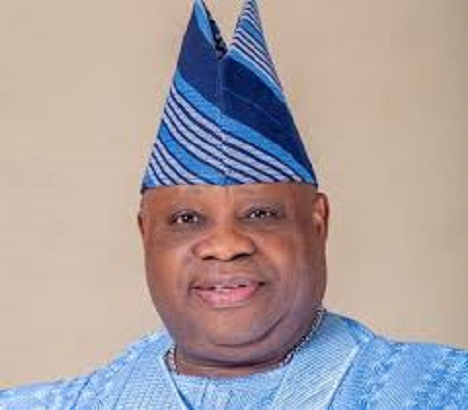Telecom
Osun Govt’s Claims of N900m Unpaid Tax Against MTN Unsubstantiated

Osun State Government, through its consultant, Global Transaction Nigeria Limited (GTNL), has been making unsubstantiated claims of outstanding tax obligations due, and requests that they be paid through the consultant.

Our Investigation has shown that MTN has settled its RoW fees to Odua Infraco based on binding RoW contract between Osun State and Oodua.
According to a document sighted by our reporter, the claim by osun state government is therefore baseless and unfounded since documents on ground has shown that the telco paid the state government through its consultant, in this case Odua Infraco.
If there is an attempt by Osun State government to severe ties with Odua Infraco, this shouldn’t impact existing agreement with RoW right holders (Odua and Osun should resolve their differences in the overall interest of ease of doing business).
During the period referenced, MTN legally partnered with the Odua Investment Company – in which the Osun State government has a significant shareholding, to lay cable in their fibre ducts in the state. This was based on the documented existing right of way approvals for Odua’s ducts provided by the Osun State Ministry of Innovation, Science and Technology.
The actual dispute is between Osun State government and Odua Infraco over the right-of-way (RoW) fees for fibre infrastructure deployment. Odua Infraco has the right of way for 1031.44 kilometres across four states (Osun, Oyo, Ondo and Ekiti States) for the construction and operation of fibre infrastructure, for which MTN executed an IRU with Odua.
The relationship between Odua and the Osun State government is governed by a May 2023 Right of Way & Easement Agreement. MTN demanded an additional letter of no objection from Odua for the transaction. However, it appears the state government is no longer interested in the relationship with Odua following the state’s appointment of Global Transaction Nigeria Limited (GTNL) as a consultant on telecommunications infrastructure and the alleged termination of the agreement with Odua.
Ignoring the existing agreement with Odua, the state government, via a letter dated 19th April 2024 (from the Special Adviser on legal matters to the Governor) demanded for the payment of N945,000,000 as Right of Way (RoW) fees for 270KMs of fibre optic and a penalty fee of N100,000,000 for the alleged non-payment of RoW. Meanwhile, the RoW is already covered under MTN’s existing agreement with Odua.
Almost universally, Nigerian state governments have acknowledged the importance of affordable right of way charges to enable the growth and development of an inclusive digital economy.
Actions taken by MTN to settle the matter
Engaged and met with members of the Executive Council of Osun State (Commissioners for Finance & Environment & Sanitation and the Attorney General) to amicably resolve the issue. However, all efforts have not yielded the desired result.
Advised Odua to settle its disagreement with the state government.
MTN has suspended all payments to Odua until the matter is resolved.
Sought the NCC’s intervention following a complaint filed with the NCC by the GTNL.
Pertinent issues
Should consultants be mandated to collect tax revenue directly on behalf of government as opposed to receiving payments directly from government?
A modern and dynamic economy rides off low-cost telecoms infrastructure. State governments seeking to charge exhorbitant right of way fees simply put more pressure on customer pricing;
Progressive state governments have waived RoW fees entirely in recognition of the economic and social benefits of affordable digital and data access.
Osun State government has provided documented right of way to MTN partners, but now wants to charge additional fees for the period in which that RoW approval was granted.
The Odua investment company, which was granted RoW by the Osun State Government and partnered with MTN, is partly owned by the Osun State Government and there is no need for this level of aggression.
Telecom
MTN, BUA, Dangote & Other Industry Giants Triumph at NGX Made of Africa Awards

Nigerian Exchange Group (NGX) hosted its annual Made of Africa (MOA) 2025 Awards on Monday, February 4, 2026. The event, held during the NGX year-end celebrations, brought together regulators, listed companies, and market operators such as MTN, BUA, Dangote, Transcorp, to celebrate achievements in compliance, sustainability, and market performance.

In his opening remarks, Dr. Umaru Kwairanga, the Chairman of Nigerian Exchange Limited, said “Excellence in compliance, sustainability, and several other categories recognises the fact that capital market operators and quoted companies must be standards not only in terms of the size of their operations but also adherence to regulations and best practices of corporate social responsibilities.”
He emphasised that the awards serve as a benchmark for excellence. He noted that the 2025 honourees demonstrated significant improvements in branding, customer service, and operational standards despite a challenging economic environment in Nigeria.
Among the evening’s significant winners was MTN Nigeria, which was honoured for its commitment to corporate transparency. The technology giant received the award for Leadership in Sustainability Reporting, emerging as the winner in a category that included Seplat Energy, BUA Cement, and Transnational Corporation of Nigeria PLC.
The award recognised the brand’s adherence to both national and global reporting standards, reflecting its role in advancing environmental, social, and governance (ESG) practices within the Nigerian corporate space.
Tobe Okigbo, Chief Corporate Services & Sustainability Officer, MTN Nigeria, said “This recognition for Leadership in Sustainability Reporting underscores our commitment to transparency and aligning with global best practices.
“As the capital market moves toward greater accountability, MTN Nigeria remains dedicated to demonstrating resilience and faith in the Nigerian economy through comprehensive and standard-compliant reporting.”
The ceremony saw several other major players in the financial sector secure multiple accolades. Chapel Hill Denham emerged as one of the night’s most successful firms, winning in categories including Fund Manager with the Largest Listed Fund Size and Market Operator with the Highest Value of Foreign Portfolio Investment (FPI) Transactions.
Other notable winners included: Cardinal Stone Securities Limited, named Broker of the Year and Equity Trader of the Year, Dangote Cement was awarded Best Issuer in terms of Fixed Income Listings, BUA Cement PLC was recognised as the Most Compliant Listed Company, and Transnational Corporation of Nigeria (Transcorp) PLC received special recognition for Capital Market Excellence in Equity.
Mr. Jude Chiemeka, the Chief Executive Officer of Nigerian Exchange Limited, congratulated the recipients, noting that the market saw a 51% close in the All-Share Index last year, making it the second-best performing market globally. He urged winners and nominees alike to continue striving for excellence to further the aspiration of a $1 trillion Nigerian economy.
Telecom
4G Dominates Nigeria’s Broadband as 5G Lags Behind

Nigeria’s broadband landscape remains anchored by 4G LTE at 52.95% market share in December 2025, with 2G holding steady at 37.37%, while 5G penetration crawls at just 3.77%, per Nigerian Communications Commission (NCC) data.

4G’s dominance stems from urban smartphone migrations and MTN-Airtel infrastructure expansions, fuelling the digital economy, as 2G persists in rural areas due to feature phone reliance and a stubborn device gap.
5G growth stalls from high smartphone costs amid inflation, telco preference for 4G’s quicker returns over capital-heavy 5G rollouts, and limited mainstream apps beyond elite urban streaming in Lagos and Abuja.
Broadband subscriptions topped 112 million, lifting penetration to 51.97%—up from 42.2% in October 2024—crossing the halfway mark for the first time, though monthly gains of 2-3 million slowed mid-year amid population growth and regional disparities.
The NCC’s 70% target stays elusive, highlighting sustained urban-rural demand but underscoring needs for affordable devices, infrastructure, and use cases to accelerate high-speed access nationwide.
Telecom
Nigeria’s Internet Users Hit 148.2m Amid Data Cost Surge

Nigeria’s internet subscriber base surged to 148.2 million by December 2025, achieving 68.3% penetration, even amid 50% tariff hikes and naira depreciation, according to Nigerian Communications Commission (NCC) data.

MTN and Airtel dominated with 86% market share, Airtel adding 1 million subscribers in December alone, while Glo and 9mobile lagged as legacy players.
Data consumption exploded 35% to 13.25 million terabytes yearly, but Nigerians spent ₦20.87 billion daily—totalling ₦7.62 trillion ($5.58 billion)—as gigabyte prices doubled from ₦287 to ₦575.
User frustrations mounted from network failures, thousands of fibre cuts due to construction and vandalism between January and August 2025, and poor service quality despite billions in revenue. 4G LTE held 52.95% share as the workhorse, 2G clung to 37.37% in rural areas, and 5G remained a 3.77% urban luxury limited by device costs and base stations.
The NCC’s 70% broadband target fell short at 51.97%, though the ICT sector boosted Q3 GDP by ₦7.47 trillion and restored telco profits post-2024 losses.
In 2026, attention shifts to quality matching rising costs, with users urged to stay powered amid persistent “spinning wheel” woes.

 General News1 day ago
General News1 day agoNigeria’s Banks Race to Meet CBN Recapitalisation Deadline Amid Verification Push

 General News1 day ago
General News1 day agoJumia Targets Break-even in 2026 After Strong Q4 Surge

 General News1 day ago
General News1 day agoBOI, MTN Foundation Unveil N1Bn Fund for Women Entrepreneurs

 General News1 day ago
General News1 day agoUBA Unveils Diaspora Platform to Connect Global Africans with Investment, Wealth Opportunities

 E-Financial1 day ago
E-Financial1 day agoNo VAT on Land, Buildings and Rent Under New Tax Law — Oyedele

 E-Financial1 day ago
E-Financial1 day agoCBN Slams Up to N10m Fine on Banks and Cheque Printers for Security Breaches

 E-Financial1 day ago
E-Financial1 day agoIs Nigeria Borrowing to Survive or to Build?

 General News19 hours ago
General News19 hours agoLeo Stan Ekeh Foundation, Zinox Group To Invest 10B on 1000 University Tech Scholarships for Indigent Nigeria Wiz-kids























